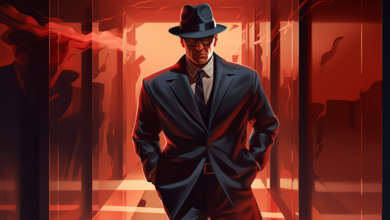The Intricate World of Secret Agent Missions
Who is a Secret Agent?
Secret agents have always captured our imaginations with their thrilling adventures and undercover operations. But who are these individuals who are tasked with protecting national security and working in the shadows?
Key Takeaways:
- Secret agents are highly trained individuals who work clandestinely to gather intelligence, conduct covert operations, and protect their country’s interests.
- They operate under false identities and are skilled in various areas such as surveillance, espionage, and combat.
- Secret agents play a crucial role in safeguarding national security and preventing threats from both external and internal forces.
1 Understanding Secret Agent Missions
A formal definition of Secret Agent Missions:
Secret agent missions can be defined as covert operations undertaken by highly trained individuals to gather information, neutralize threats, and protect national security. These missions are often carried out undercover, requiring agents to operate behind enemy lines or in high-risk environments.
The critical role of Secret Agent Missions in National security:
Secret agent missions are an integral part of national security strategies. They help governments gather vital intelligence, disrupt enemy activities, and preempt potential threats. By infiltrating hostile organizations or monitoring suspicious activities, secret agents provide invaluable insights that aid in preventing terrorism, espionage, and other criminal activities.
The intense world of Secret Agents and their missions:
Secret agents operate in an intense and high-stakes environment, where split-second decision-making and adaptability are crucial. They often live dual lives, maintaining cover identities while navigating dangerous situations. These missions require not only advanced skills in combat, surveillance, and intelligence gathering, but also mental fortitude, resilience, and the ability to operate under extreme pressure.
2 Advantages and Necessities of Secret Agent Missions
Secret agent missions offer several advantages and serve as a necessity for national security. Some of the key advantages include:
- Covert Operations: Secret agents can gather intelligence and perform actions without alerting potential threats or compromising ongoing investigations.
- Surveillance and Espionage: Secret agents have the skills to monitor and collect information on individuals or groups who pose a threat to national security.
- Preventive Measures: By infiltrating criminal organizations or tracking suspicious activities, secret agents can prevent potential threats before they materialize.
- Global Presence: Secret agents operate internationally, building networks and collaborations to enhance national security and counter threats from abroad.
3 Different Types of Secret Agent Missions
Secret agent missions can vary in nature and objective, depending on the specific needs of national security. Some common types of secret agent missions include:
- Intelligence Gathering: Agents gather critical information about potential threats, including plans, activities, and connections.
- Counterintelligence Operations: Agents work to identify and neutralize enemy spies or organizations involved in espionage activities.
- Espionage and Infiltration: Agents gain access to enemy organizations or networks to gather information and disrupt their operations.
- Undercover Operations: Agents assume false identities to infiltrate criminal or terrorist organizations, gathering evidence and facilitating their dismantlement.
- Assassination and Target Elimination: In extreme cases, secret agents may be tasked with eliminating specific targets to neutralize high-level threats.
4 Deep dive into the Operation of Secret Agent Missions
Secret agent missions operate with a high level of secrecy and precision. Here is a glimpse into their operational process:
- Covert Planning: Before a mission begins, secret agents meticulously plan every detail, considering potential risks, target objectives, and available resources.
- Surveillance and Reconnaissance: Agents conduct thorough surveillance to gather intelligence on the target or the environment they will operate in.
- Infiltration: Agents use their covert skills to infiltrate target organizations or areas undetected, taking on false identities and blending in with the surroundings.
- Information Gathering: Agents gather crucial intelligence on target activities, individuals, or plans while minimizing their exposure or detection.
- Communication and Reporting: Agents maintain secure communication channels with their handlers and report their findings to the intelligence agencies.
- Adaptability and Quick-thinking: Agents must be adaptable in rapidly changing situations, making crucial decisions on the spot to ensure mission success.
- Extraction and Exit: Once the mission is complete, agents use various extraction techniques to leave the target area without raising suspicion.
5 Key Factors that dictate Secret Agent Mission Success
The success of secret agent missions relies on several essential factors:
- Training and Skills: Agents undergo extensive training in various fields such as combat, surveillance, intelligence gathering, and communication to excel in their missions.
- Intelligence and Information: Access to accurate and timely intelligence is crucial for planning successful secret agent missions.
- Covert Techniques and Equipment: Agents rely on specialized tools, gadgets, and techniques to maintain their cover and effectively carry out their missions.
- Teamwork and Support: Collaborative efforts between secret agents, intelligence agencies, and other stakeholders play a vital role in mission success.
- Adaptability and Quick-thinking: Agents must possess the ability to adapt to unforeseen circumstances and make accurate decisions in high-pressure situations.
6 How to Prepare a Secret Agent for Missions: On-field Training
Secret agents undergo rigorous training programs to prepare them for their challenging missions. Some key on-field training techniques include:
1. Beginning with basic Secret agent training
A secret agent’s training starts with mastering fundamental skill sets, which form the foundation for their future operations. These skills include physical fitness, self-defense, firearms proficiency, surveillance techniques, and intelligence-gathering methods.
The importance of fundamental skill set in agent training:
Basic training equips secret agents with the essential skills needed to operate in the field. Physical fitness ensures they can handle the demands of challenging missions, while self-defense and firearms training provide them with the capability to protect themselves and neutralize threats effectively.
2. Create simulated mission scenarios
Simulated mission scenarios are invaluable for training secret agents in realistic environments that resemble their future assignments. These scenarios help agents develop practical skills in problem-solving, decision-making, and adapting to unexpected situations.
3. Techniques to camouflage in plain sight
Agents learn to blend into their surroundings and remain undetected through the art of camouflage. Training in disguise, changing appearances, and adopting alternative identities helps agents operate covertly while avoiding suspicion.
4. Quick decision-making skills
The relevance of fast and effective decision-making skills:
Secret agents often face time-sensitive situations that require quick thinking and decisive action. Intense training helps agents develop the ability to assess complex scenarios rapidly, weigh the risks, and make informed decisions under pressure.
5. Mastering the art of communication
Clear and effective communication is vital for secret agents to successfully carry out their missions. Training focuses on developing skills in verbal and non-verbal communication, encryption techniques, and establishing secure channels of communication.
To attain excellent communication skills, an agent should:
- Learn various languages: Language fluency enables agents to operate in different regions and communicate with local populations effectively.
- Develop non-verbal cues: Learning to interpret and utilize subtle body language signals helps agents convey messages covertly.
- Utilize advanced technology: Keeping up with modern communication tools and encryption methods ensures secure and efficient communication.
6. Physical and Mental preparation
Secret agent missions can be physically and mentally demanding. Training includes physical endurance exercises, stress management techniques, and mental resilience exercises to prepare agents for the rigors they may face in the field.
Here is how agents do physical and mental preparation:
- Physical fitness training: Agents undergo intense physical exercises, endurance activities, and martial arts training to build strength and endurance.
- Stress management: Agents learn various stress coping mechanisms, including meditation, breathing techniques, and mental focus exercises.
- Mental resilience building: Training focuses on developing mental toughness, emotional stability, and the ability to quickly recover from setbacks.
7. The art of weaponry and gadgetry
Secret agents have access to cutting-edge weaponry and gadgets designed to aid them in their missions. Training includes mastering the use of firearms, explosives, surveillance equipment, and other specialized tools.
A look into the modern Secret agent gadgets:
- Miniature surveillance devices: Agents are trained in the use of hidden cameras, listening devices, and tracking devices to gather intelligence discreetly.
- Covert communication tools: Secret agents use encrypted communication devices, covert earpieces, and hidden microphones for secure and covert communication.
- Innovative weapons: Specialized weapons such as concealed knives, pen guns, dart weapons, and non-lethal incapacitating devices are part of the agent’s arsenal.
7 How to Prepare a Secret Agent: Off-field training
Apart from on-field training, secret agents also undergo off-field training to enhance their capabilities further. Some key areas of off-field training include:
8. Cultivating International Relations
Agents cultivate relationships with intelligence agencies, law enforcement groups, and other organizations at the national and international levels. Building alliances and networks helps agents access vital information and resources during their missions.
9. Learning multiple languages
Fluency in various languages allows secret agents to blend seamlessly with different cultures and operate covertly in diverse environments. Language skills enable effective communication, interpretation, and intelligence gathering.
10. Building an Incredible cover story
Agents learn the art of crafting plausible cover stories and maintaining their false identities. These cover stories serve as a shield against suspicion and help agents operate undetected in their target environments.
8 Preparation for Secret Agent Missions: Technical Trainings
Some secret agent missions require specialized technical skills. Training in these areas ensures agents are prepared for specific assignments. Some key technical trainings include:
- Cybersecurity training equips agents with knowledge and skills to navigate the digital space, protect crucial information, and conduct online investigations.
- Electronic Surveillance and Countermeasures: Agents learn techniques to detect and neutralize electronic surveillance devices and counter-espionage activities.
- Forensic Analysis: Training in forensic analysis helps agents collect and analyze evidence, fingerprints, DNA samples, and other forensic data critical to their investigations.
- Explosives and Demolition: Agents receive specialized training in handling explosives, demolitions, and bomb disposal to neutralize explosive threats effectively.
9 Tools and Gadgets in the world of Secret Agents
Secret agents rely on an array of tools and gadgets to aid in their missions. Some common tools include:
- Hidden Cameras and Microphones: Compact recording devices used for covert surveillance and gathering evidence.
- Encryption and Decryption Tools: Software and hardware used to encode and decode sensitive information for secure communication.
- Disguise Kit: Various materials and techniques used to change appearances, including wigs, prosthetics, and makeup.
- Lock-picking Tools: Specialized instruments that enable agents to bypass locks and gain access to secured areas.
- Tracking Devices: Small, portable devices that allow agents to track the movements of individuals or objects discreetly.
10 Strategies and Best Practices for Successful Missions
Secret agents employ various strategies and best practices to ensure the success of their missions. Some key approaches include:
- Risk Assessment and Planning: Agents conduct thorough risk assessments and develop detailed plans, considering all potential obstacles and contingencies.
- Intelligence Gathering: Extensive intelligence gathering ensures agents have accurate and up-to-date information to make informed decisions.
- Coordinated Teamwork: Secret agents work closely with their support teams and collaborate with other intelligence agencies to achieve mission objectives.
- Maintaining Cover and Secrecy: Agents prioritize maintaining their cover identities and ensuring their operations remain covert.
- Adaptability and Flexibility: Successful agents possess the ability to adapt quickly to changing circumstances and recalibrate their strategies as needed.
- Continuous Learning and Skill Development: Secret agents consistently update their skill sets and stay abreast of new technologies, techniques, and best practices in their field.
Conclusion
Secret agent missions are an intricate and essential aspect of national security. These missions require highly trained individuals who possess a wide range of skills, from combat and surveillance to intelligence gathering and undercover operations. Through meticulous planning, intensive training, and state-of-the-art tools, secret agents navigate the complex world of espionage to protect their countries and safeguard global security.


















